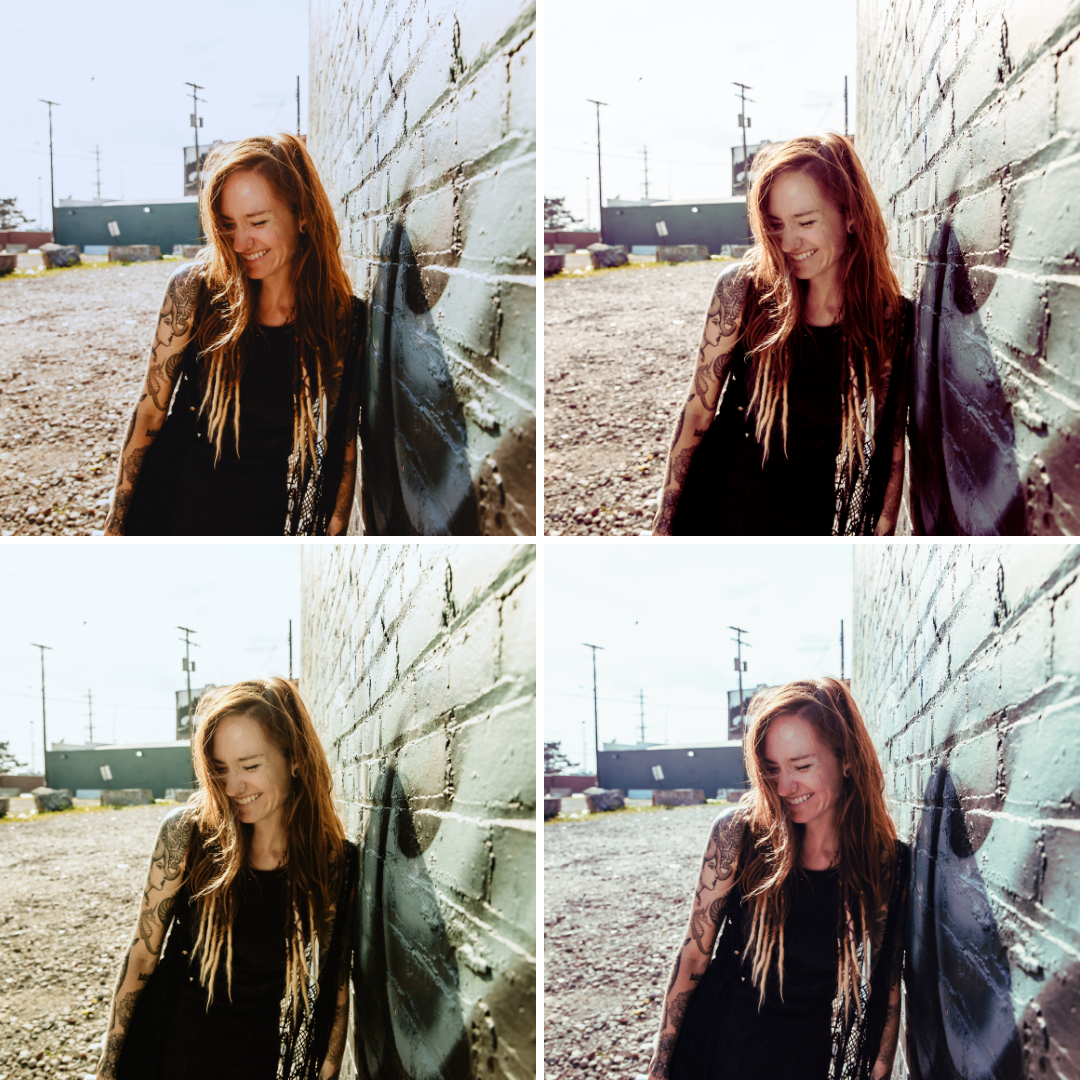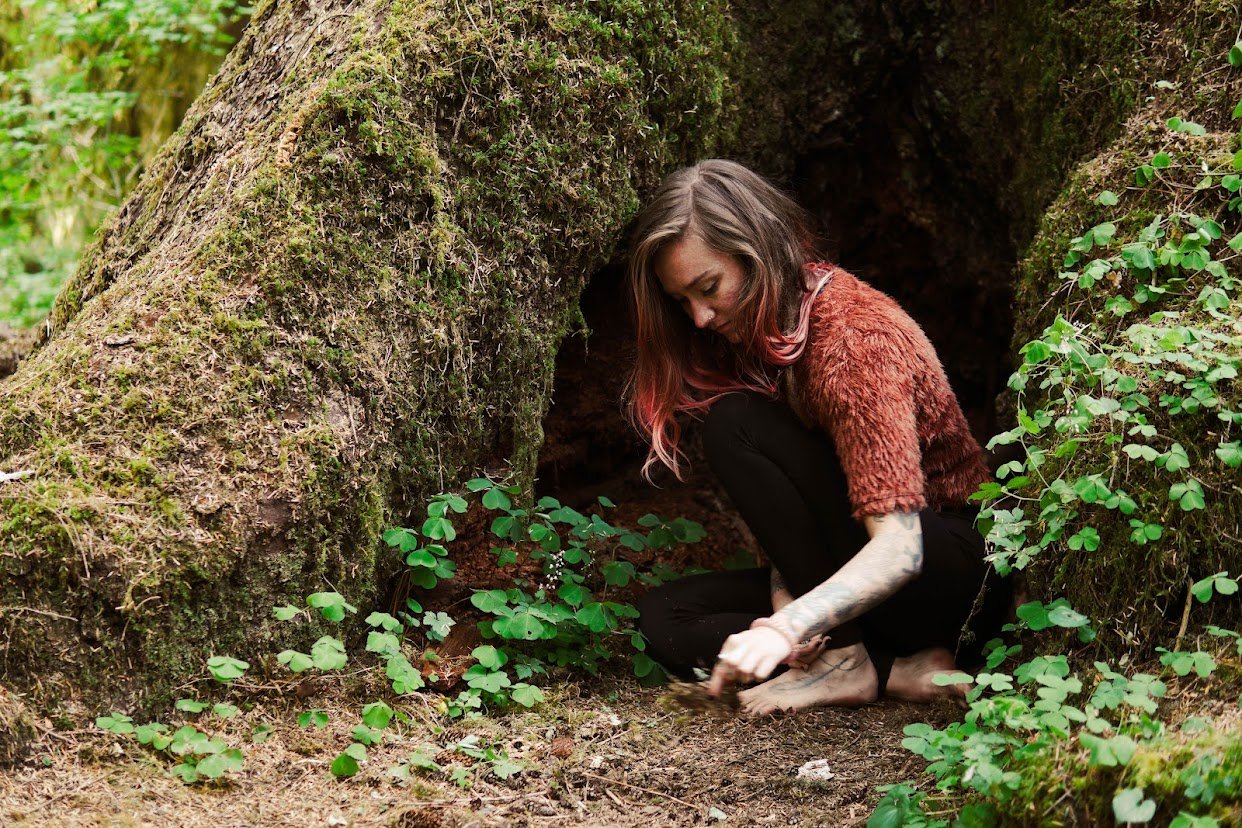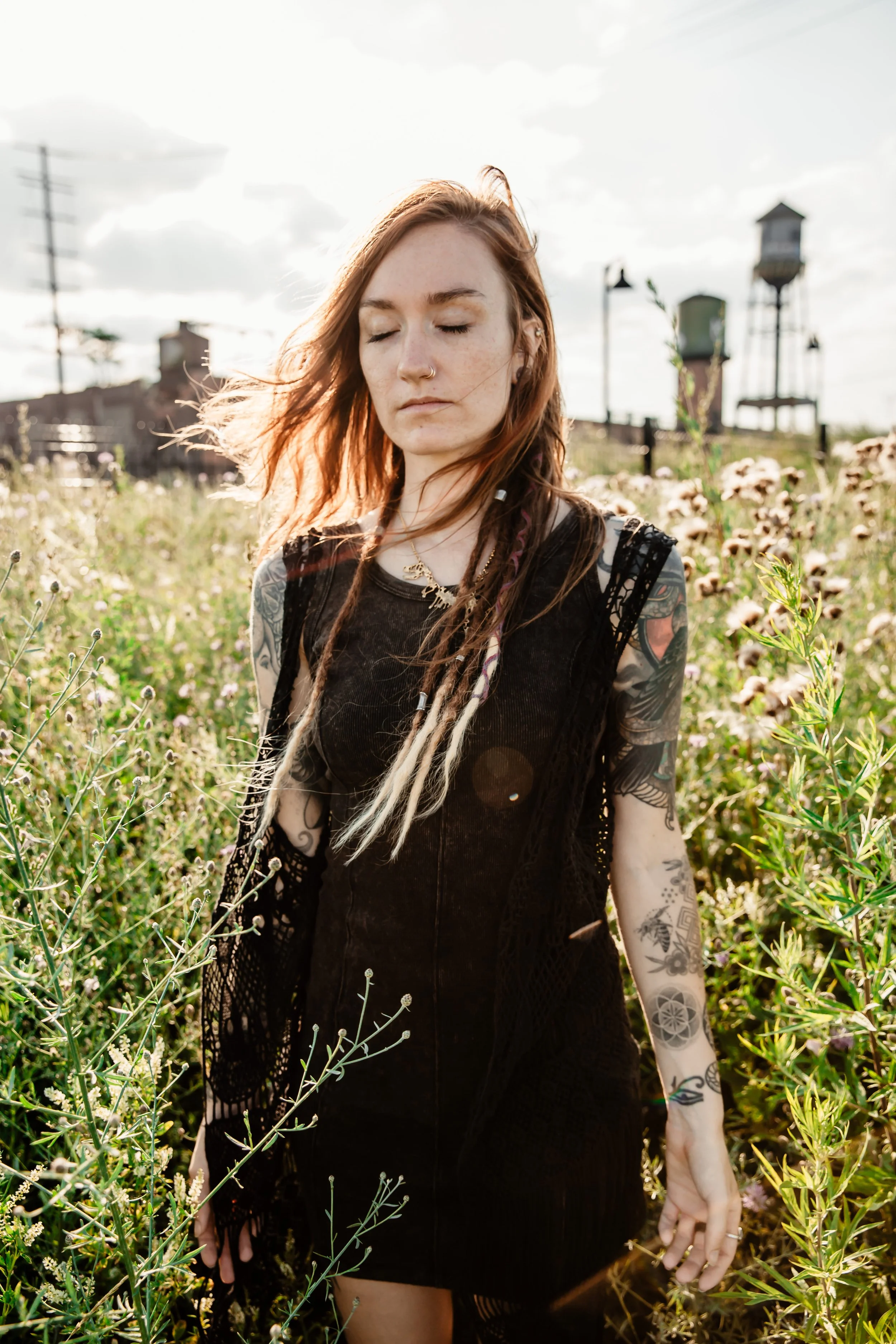the four selves
Or as I call them - the Four Jess’s.
I came up with this concept deep in meditation and reflection with the BioCybernaut Institute in Sedona. Here, they measure your brain waves and teach you how to get into alpha state in order to do deep internal work on your subconscious; you can access deep subconscious healing with forgiveness and compassion through finding truths, previously hidden.
Until you make the unconscious conscious, it will direct your life and you will call it fate.
- Dr. Carl Jung
Something that we all know - forgiveness can be really hard. In my time of reflection and solitude in a dark room in Sedona - it occurred to me why forgiveness can be so difficult.
The answer I found is: because we are made up of different versions of ourself - so there are different people inside you that have to be in agreement in order to give permission to fully forgive.
Now, I’ve already written some blogs on forgiveness - you can find one here. However, this is a brand new concept, an evolved method of forgiveness, if you will.
Say you were hurt when you were really small, which may have made you sad, or feel powerless or hopeless.
Perhaps you were angry and vengeful as a teenager.
Now, because some time has passed, you can look back on it logically without getting too triggered (although you still might get a little triggered.) Compassionate thoughts like “they were doing their best with the information they had,” may float around in your awareness.
Perhaps in 40 years you can look back on it and be completely at peace with it.
These are the Four Selves - these selves not only have to feel the feelings, but have to allow external expression of them in order to approve Full Forgiveness. Let me explain:
The little self
The little self is most likely the one that got hurt. How you got hurt will vary from person to person. Maybe you weren’t physically cared for, maybe you weren’t emotionally cared for, maybe you weren’t mentally cared for, and maybe your life circumstances didn’t provide safety or stability to feel cared for.
This makes the Little Self sad; feelings of despair arise, feelings of ‘I’m not worthy,’ ‘I’m not loveable,’ will come up here. Feelings of ‘I’m unsafe,’ ‘I don’t belong,’ can arise here. Feelings of shame can arise here because ‘If I was good enough this wouldn’t have happened to me.’
Sound familiar?
There can be no forgiveness without acknowledging and fully feeling the emotions.
Why?
Because your heart and your head have two different consciousnesses. Logically reasoning something in your head doesn’t access your emotions or allow you to feel in your heart, and forgiveness is a feeling, not a thought.
Let’s allow the little self to be sad, to cry, to yell, to sob, to despair, to deeply feel the feelings of sadness, AND to allow those feelings to become unstuck in our body and be expressed.
So, we emote and express the emotion; after all emotions are energy in motion, and we feel things to heal them. This is the opposite of shoving things down, compartmentalizing, and ‘I’ll deal with that later,’ mindsets. We are pulling these emotions out of being stuck in our body to be processed, live their entire life span (beginning, climax, resolution) and therefore actualized and finally released.
the teenage self
Because the Little Self cannot protect itself, our Teenage Self avenges the Little Self. It has to, because now, it can! The Teenage Self is smarter, bigger and physically stronger than the Little Self. The Teenage Self has access to more resources, coping skills, concepts, wisdom, friends, therapists, counselors.
So, outwardly - we might rebel, we might steal, smoke, drink, yell; or inwardly - we get depressed and implode on ourselves, self harm, become introverted, stay away from people, isolate, maybe we take things personally, or out on other people.
This of course will look different to different people. The way we react will always vary based on our environment and personality.
The idea here is the Teenage Self is now protecting the Little Self, and it will do it anyway it can.
So what do we do?
Once again, we allow the emotions. We allow ourselves to fully feel the hatred, resentment, and betrayal. We allow ourselves to feel these emotions as we felt them as a teenager and once again we express them.
To help process this rage we might hit a pillow with a baseball bat, find our nearest Rage Room, listen to angry music to allow the fullest expression of these emotions. We might write letters we never send to those who have harmed them.*
This is cathartic for the Teenage Self.
the current self
Now we are older and wiser, and have the ability to intellectualize concepts: ‘My dad was this way because his dad was this way.’ ‘My parents did the best they could with the resources they had.’ ‘Therapy was taboo when my parents grew up.’ These are enlightening realizations, no doubt, but it still does nothing for our Little Self that was deeply injured and couldn’t protect itself and our Teenage Self that needs someone to answer for the crimes committed against the Little Self.
Time has given us space to heal, but if we don’t allow our Little Self to cry, and our Teenage Self to rage, and both to express this outwardly, the process is incomplete. Mentally understanding an emotional concept does nothing because it’s not on the same wavelength nor does it speak the same language.
Here we must accept the feelings and allow our Little Self and Teenage self to express these emotions without judgment. To allow yourself to hit rock bottom, to fall in a puddle sobbing or howl at the moon.
Now, some of us do not feel like we have certain emotions, or that certain emotions don’t have an affect on them. I’ve met a lot of people who claim they never get angry and yet have uncontrollable sugar addictions. I find whatever emotion you definitely don’t think is a problem - is definitley a problem - and in dialogue with it you can find fertile soil for self inquiry and evolution.
If you have trouble accessing these emotions try my concept on Emotion Hacking:
If you can’t access sadness - try watching a sad movie about a dog, trust me you’ll cry.
If you can’t access anger - try listening to the angry or angsty music you loved in high school.
If you can’t access those old feelings - get a sound healing session with me and we’ll bring them right up to the surface to work on them.
The point of Emotion Hacking is sometimes we have trouble accessing certain emotions, this is normal, so we use an external stimulus (a sad movie or angry music) to pull up resonance in our internal space.
the old self
The Old Self is wise, the Old Self has lived so long and seen everything you have grown through. The Old Self is the version of you who has allowed the Little Self to cry, the Teenage Self to yell, and the Current Self to heal by feeling and responsibly expressing.*
The Old Self is who you needed when you were younger. The Old Self has compassion for all Selves AND all the people involved in the circumstances that resulted in injury. This is because the Old Self is all of your expressions of self and also has a grander perspective having transcended the stormy seas of your youth, your pain and your suffering.
This next part is a Thought Experiment so try this on like you were trying on a T-shirt - if it fits keep it, and if it doesn’t take it off:
Quantum Physics says that the present moment, right now, is the only thing that is technically real. So if we access all Four Selves in the present moment we are Little, Teenage, Current and Old together, united - therefore by feeling all the emotions and allowing the physical expression of those emotions we can find forgiveness because we've received permission from all the Four Selves, because we’ve allowed them to feel, to express, and to be witnessed by all other Selves.
Here we can release the binds and emotions that hold us captive to these past harmful circumstances or people - in this spaciousness of acceptance and surrender, through feeling and healthy expression, and then letting go of expectation.
feel the feelings and then rest in the spaciousness
Once you allow yourself to feel all the feelings you might find there is a sensation of spaciousness, of lightness and freedom. You might have more compassion and true forgiveness because you didn’t try to gloss over your own pain. In accepting our pain and dialoguing with it we deepen our understanding of ourselves, and therefore others.
When we forgive ourselves we can more easily forgive others, when we allow our emotional expression we can sit easier with the emotional expression of others.
~
Try it on and let me know what you think!
~
Out beyond ideas of wrongdoing and rightdoing there is a field. I’ll meet you there.”
—Rumi
*Expressing responsibly is important and an internal journey. You don’t have to do it alone and can have a vulnerability buddy. You are allowed to feel angry; just make sure you are being emotionally responsible by not blaming or yelling at others. You are allowed to hit a pillow with a baseball bat - that does not affect anyone else negatively. This is about YOU and your feelings.
As an eternal student
I know enough to know I can always learn more.
That is why it is so important to me to continue my education learning new ways to best support you on your healing journey. My eternal mission and my responsibility to my clients is to provide them with the utmost care.
In 2023 I did two massive 7 day intensive trainings. One with BioCybernaut in Sedona in March and one with the Hoffman Institute in Chester, Connecticut in November. Warning: these trainings are not retreats, and they are not easy. You have to fully commit to yourself and be your own accountabilty buddy. You have to seriously want to change.
At my Biocybernaut Training I not only learned how to train my brain, I learned how to alter it in real time. During the training I was hooked up to an EEG which uses Biofeedback to show your brainwaves (represented by numbers) as they are happening. Watching my brainwaves shift based on what I was thinking about enabled me to change the way I think, react, feel and heal.
For 7 full days I was in a cold dark room (seriously!) just learning how to train my brain and focus my thoughts to achieve alpha state. An unfocused-focus or a focused-unfocused is the best way I can describe alpha although google describes it as ‘a wakeful relaxation.’
Consistent practicing throughout 7 days and and constant biofeedback from my brain waves helped root this change deep inside myself. As you all know how I feel about Forgiveness - I am happy to say that my view of forgiveness has expanded! This is wholly due to my time at BioCybernaut and the Hoffman Institute!
I have had trouble with forgiveness in the past and have written about ‘hacking forgiveness.’ The techniques used in BioCybernaut and Hoffman helped me discover forgiveness from a deep internal and highly expansive way. I truly feel like a new Jess.
The Hoffman Process works on forgiveness between yourself, your inner child and your relationships with your family, and how that influences your current relationship dynamics. Do you ever get sick of being yourself sometimes? With the same patterns coming up over and over again in relationships? There comes a point where you’re like okayyyyyy…. maybe its not everyone else when the common denominator is ME. (ha!)
Both BioCybernaut and Hoffman work to honor exactly how you felt at the time, they allow you to express, to be angry, to be hurt, to feel that rage, resentment, to feel that betrayal, that sticky shame and horrible guilt. In doing so, you are deeply honoring how your Inner Child felt at the time and you are allowed to point the finger at those around you who you perceived were ‘guilty’ for causing this pain. One of my favorite quotes from Hoffman is:
Everyone is guilty, and no one is to blame.
This sentence exploded my brain. Everyone is guilty…. and no one is to blame. How painfully poetic and beautifully true.
I, we, you, they, us are all guilty, but we’re not to blame.
After allowing yourself to feel the hurt and the pain you start to understand that the people around you who caused you pain were only trying to avoid their own pain.
Now, of course we all know this logically, but through the techniques used in BioCybernaut and Hoffman you are going through and growing through a spiritual pilgrimage and building up a Hero’s Journey to get to these places. Remember both of these programs are 7 days fully intensive. At Hoffman they take your phone for this whole time (eeeek!) You have to fully commit to yourself, to heal, for your future self, to save yourself and the way you relate to others.
In these programs you are receiving feedback from how you feel about these situations and circumstances and healing them from the perspective of the subconscious mind. These two programs are absolutely INCREDIBLE and I would highly recommend them.
I did BioCybernaut first, in March of 2023 and Hoffman second in October 2023. I liked the way I did these programs because they 100% build off one another. After Hoffman I went back to Michigan and spent a whole fucking week with my parents! If you know, you know :p
Since then, I feel more aligned in myself, I blame people less for things that have happened and I have been able to be so me-y it’s been so full of bliss and so fantastic. I feel so aligned in my center and my truth and I have been able to speak it from such a grounded and diplomatic way. I have been able to see people from their wounded Inner Child and the amount of compassion I have for everyone around me is magnificently overwhelmning.
I am finally free from my patterns - whether they were passed down from generations or created by Inner Child me to avoid pain.
The longer I sit as a student, the better I rise as a teacher.
If you have any questions or want to work with me, please feel free to message me as I would love to share more!
xoxox
shame
SHAME
Shame is a powerful and often overwhelming emotion that can be difficult to shake off. It is the feeling that we are flawed, inadequate, or unworthy of love and acceptance. Shame can be triggered by a wide range of experiences, from small mistakes to major life events, and it can have a significant impact on our mental and emotional well-being. It's the feeling that we are not good enough or that we have done something wrong, and it often leads to a sense of isolation and disconnection from others.
Shame is an intensely painful feeling or experience of believing that we are flawed and therefore unworthy of love and belonging. ~ Brene Brown
When we experience shame, we believe that there is something fundamentally wrong with us, and that we are different or separate from the people around us. This can be incredibly isolating and can lead to feelings of loneliness and despair.
In my opinion, shame and guilt are some of the worst feelings a human can feel because of how sticky they are - they’re like quicksand and the more you feel them the more they suck you under. I believe this happens because of my belief in past lives, and ancestral and intergenerational trauma that goes all the way back in time, but remembered and/or echoed through DNA. Once upon a time when we were in nomadic tribes we depended on community for survival - if you did something bad you were potentially exiled from your community. This exile could have and would have meant death. I think it’s possible shame and guilt feel so awful because they bring up past-life memories and emotions of despair and threaten death.
Luckily for all of us, it IS possible to break the cycle of shame. The first step is to recognize and acknowledge and NAME our feelings of shame. We must be willing to confront our shame head-on and recognize that it is a normal and natural emotion - just like all other emotions. Remember all your Emotions are Like Puppies, and they are all valid.
Another effective approach is to challenge the negative beliefs that underlie our feelings of shame. Remember - we parent ourselves like our parents did when we are stressed. In the absence of our parents, we can become our biggest critic. Question where those internal voices are coming from - see if you can reframe that Critical Judge Self to perhaps a Supportive and Benevolent Coach. By questioning the validity of our negative self-talk and reframing our thoughts in a more positive light, we can begin to shift our perspective and feel more confident in ourselves.
I like to put sticky notes around my house reminding me “I did the best that I could in that moment,” “I can always try better tomorrow,” “I’m doing great.” So that every time my negative self talk may arise there is a sticky note not too far in the distance cheering me on. This begins to create a feedback loop: negative thought arises -> we feel it -> we find it in our body and name it -> we accept and breathe that this is all a part of being human -> we create a new thought -> if the negative thought is still there, that’s okay, -> begin again at step 1.
Forgive yourself for what you didn’t know before you learned it ~ Brene Brown
This is my favorite quote from Brene Brown. I believe there are no such thing as mistakes - only lessons that help us grow into the people we have always been on the inside. Another way to overcome shame is to practice self-compassion. This means treating ourselves with kindness and understanding, rather than judgment and criticism.
Allow yourself to grow through what you go through.
I believe that we are the people we needed when we were younger.
Let that sink in for a second.
We are, in our current self, the exact people we needed when we were younger. Allow yourself to go back in time and give the little version of yourself exactly what they needed. Re-parent yourselves with loving-kindness, listen to your inner self with compassionate understanding.
Ultimately, overcoming shame requires us to be brave and vulnerable. It means acknowledging our flaws and mistakes, and accepting ourselves as we are - beautifully flawed and perfectly imperfect. When we are able to do this, we can break free from the cycle of shame and live a more authentic and fulfilling life.
The fear of judgment and rejection can prevent us from being our authentic selves and can even lead to self-destructive behaviors. It's important to recognize and address feelings of shame in order to live a more fulfilling life. Just like I wrote about in Vulnerability: A Superpower, there is strength and alchemical gold in being vulnerable because it helps you connect more authentically to others.
Alchemy
I believe in the magic of Alchemy, or turning non-gold materials into gold through magic. Circumstances of our life will happen to us and AND for us; it is up to us to extract the gems of truth from these ordinary or unfortunate experiences and transmute them into gold.
I hope you will go out and let stories, that is life, happen to you, and that you will work with these stories... water them with your blood and tears and your laughter till they bloom, till you yourself burst into bloom. ~ Dr. Clarissa Pinkola Estes
The story of the lotus in Buddhism reminds me of alchemizing our life experiences and transforming them into enlightenment. The lotus starts its life from the bottom of a dirty pond, it grows upwards towards the light until finally transforming into the beautiful lotus flower that sits above the muddy water, becoming the illuminated flower that we all know and love. This is like us through life - we are born under certain conditions that we must grow upwards and expand beyond. Throughout life we are searching for the light - whether that is love, our purpose, money, etc. We stretch and reach towards this goal until finally achieving it and blossoming open above the mucky muck, reaping all the goodness that we have sown in the sunlight of this awareness.
This is the same with alchemizing our shame and vulnerability into gold for others. Shame thrives in secrecy and isolation, so by sharing our experiences with others, we can begin to build more meaningful connections with the people around us.
don’t ‘should’ on yourself!
There is no such thing as something you should have done. It simply doesn’t exist. What if the only thing that is truly real is this moment we’re having? You did your best at the time, with the knowledge that you had, and regardless of the outcome you have gained wisdom.
This is important: you did not walk away empty handed, you have an expanded awareness of the situation; you have gained wisdom and experience that you can apply to future circumstances.
Everything in your life has lead you to the moment you’re having right now. If you like where you are then nothing you have done can be seen as a mistake. If you don’t like where you are, instead of kicking yourself, focus your energy here in the present moment.
The magic of the present moment is what builds and blossoms your future. Changing your actions right now can create a new path forward. If you tried to plant a garden every year in the same place with the same seeds, and every year it didn’t work - wouldn’t you try changing something? We as humans are just more complex gardens :)
Nothing changes if nothing changes.
I remember going through a difficult break up and thinking “I should have done this,” “if only I did this,” and then having an epiphany that our hearts HAVE to break throughout our life! This happens for us so our hearts can expand and hold more love. This is the whole philosophy of Kintsugi - the Japanese art of repairing broken pottery with gold - making something that broke even more beautiful than it was before it broke.
Everyone has cracks, that’s how the light gets in. ~ Leonard Cohen
Ultimately, the key to overcoming shame lies in cultivating self-compassion and self-love. By recognizing our inherent worth and treating ourselves with kindness and understanding, we can begin to heal the wounds that shame has caused and move towards a more fulfilling and authentic life.
By acknowledging and accepting our experiences and emotions, we can begin to work through them and find ways to move forward. By sitting with our discomfort, and practicing being comfortable being uncomfortable we begin to detach from these emotions. Rather than “I am shameful” we realize “shame is visiting us.” This gives us permission to feel what we feel without judgement.
Once again:
Forgive yourself for what you didn’t know before you learned it ~ Brene Brown
*I highly recommend listening to Brene Brown’s various youtube videos and podcasts on shame! She is highly informative, an amazing and compassionate educator and a deep listener <3
vulnerability: a superpower
Vulnerability is an essential part of the human experience. It is the state of being exposed to the possibility of harm or damage, either physically or emotionally. Vulnerability is often viewed negatively, associated with weakness or frailty. However, it is important to recognize that vulnerability can also be a source of strength and growth; a superpower.
Like most of us ‘black sheep,’ Highly Sensitive People (HSP’s), empaths and/or lightworkers, I used to think feeling my feelings so deeply and expressing my vulnerability was a curse. But it also felt inauthentic to feel things so deeply without sharing them because I longed for connection despite feeling isolated in my depression. I read somewhere (later in life) that when you’re depressed you’re actually more connected to the collective than when you’re happy. Depression will lie to you and tell you you’re alone, but in that moment of your darkest hour you’re more connected to everyone else than ever before. I think this is because we all experience pain, but not all of us are able or privileged enough to experience the highest of highs. What I have come to realize through my experiences of long term anxiety and depression throughout my teens and early 20’s is that sometimes the lowest of lows allow me to know what the highest of highs feel like. It’s like without the lows as a baseline - how would I know how high the highs get?
People who wade into discomfort and vulnerability and tell the truth about their stories are the real badasses. ~ Brene Brown
Vulnerability is often seen as a weakness or a flaw. It's something we can try to hide from others and even from ourselves. However, vulnerability can be a strength that can help us bond more deeply with others and become more resilient in the face of life's challenges. Have you ever shared something with someone who accepted and loved you despite what you shared? Remember the amount of love and gratitude and appreciation you felt for that relationship?
…the Grinch's small heart grew three sizes that day. ~ Dr. Suess
strength in vulnerability
I started to realize feeling everything so deeply wasn’t a bad thing, it connected me to more people, it made me more compassionate, patient and more understanding of what my fellow human was growing through.
This is the lesson of the Throat Chakra teaches us power through vulnerability - sharing our truth brings the people together and completes the circle. Storytelling connects us through weaving threads of dialogue and finding resonant nodes and related topics. When we share our wounds and truth, others feel more comfortable sharing, which opens hearts, expands minds, and deepens relationships.
Vulnerability is not weakness; it's our greatest measure of courage. ~ Brene Brown
The planetary alignments and retrogrades we experienced at the end of 2022 really put me into an introverted, reflective state where I was reeling from such intense unworthiness and feelings undeserving of the life I live. These emotions and feelings were so intense I was beginning to implode into myself so I decided instead of letting these emotions direct my downward spiral, I would shine a light into this darkness and share them with my friends and boyfriend instead.
As SOON as I shared my emotions they sighed, releasing their breath and the heaviness that came with it, “me too,” they said. Through sharing our vulnerability and being so honest with ourselves and each other - and supporting each other through working with our own brand of feelings, we were able to relax fully into ourselves, our truth, and each other.
Vulnerability can also be a source of strength in difficult times. When we are vulnerable, we allow ourselves to feel and process our emotions, even if they are painful. This can be difficult, but it can also help us to move through difficult experiences and come out stronger on the other side.
In order to embrace vulnerability as a superpower, we must learn to be kind to ourselves. We must recognize that vulnerability is a sign of courage and strength. We must also be willing to be patient with ourselves and with others, as this can be a slow and sometimes challenging process.
When we are vulnerable, we create deeper ties with the people around us. It requires trust, and when we are willing to share our true selves with others, we create an environment of trust and understanding.
Vulnerability; a superpower
Vulnerability can be scary. It requires us to let go of control and trust that others will not use our vulnerabilities against us. It can be difficult to be honest and open about our struggles and weaknesses, especially in a world that often values strength and independence above all else. This can be terrifying because it makes us feel exposed and open to judgment, but it can also be incredibly empowering.
Vulnerability is not winning or losing; it's having the courage to show up and be seen when we have no control over the outcome. ~ Brene Brown
By being vulnerable, we are being authentic and honest and therefore we can create deeper connections with others. We acknowledge our emotions and our limitations, we become more resilient in the face of challenges, and learn to be more compassionate to ourselves.
So, the next time you feel afraid to be vulnerable, remember that it can actually be a source of strength and power. By embracing vulnerability, we give ourselves permission to be imperfect, and we show others that it's okay to be imperfect too.
Through Vulnerability, we Alchemize our pain into a Superpower.
how to hack forgiveness
For over 10 years I have worked with a lot of people sharing their life stories with me. A lot of times people say what they are sharing is things they’ve never shared before, to anyone, ever. A couple patterns I notice about forgiveness is people wanting to forgive and being unable to, or jumping to forgiveness without being ready, or punishing themselves for not being able to forgive. This is common, but it’s something we need to unpack.
As humans we feel a full spectrum of emotions from sadness and anger, and jealousy to joy, happiness and ecstasy. For our time here and now as humans, all of these emotions are valid, as I’ve written about before in Emotions are like Puppies. You are allowed to feel anyway you want. If someone did something to you that is beyond forgiveness (which I have heard many stories where this could be the case) - it is okay to be unable to forgive them.
I know that might sound weird at first - but hear me out for a second. Forgiveness is amazing, it’s releasing, it burns the ties that bind, it’s incredible!
But!
Sometimes it takes time to fully achieve forgiveness and sometimes it is impossible to get there. If you punish yourself your whole life for being unable to forgive, you are suffering twice - once with the trauma and again torturing yourself for not being able to forgive; this is, of course, even worse for your mental and emotional well-being.
To get to true forgiveness, you have to feel ALL THE THINGS: the hatred, resentment, disgust, shame etc. because! jumping too quickly to forgiveness could be spiritually bypassing (i.e. ‘I need to forgive because I’m spiritual, woke, etc…’) or gaslighting yourself (i.e. ‘It wasn’t that bad, other people have it worse, I’m overreacting, etc.’)
Your feelings are valid. You don’t need to do anything. You are the main character in your own life.
It’s also possible if you jump too quickly to false forgiveness, later in life these unprocessed emotions like the unfelt anger, hatred and/or resentment could bubble up again when their effects are more intense. In my opinion, the reasons these emotions can be more intense than the initial ones is because they’ve become infected and irritated from being shut down and compartmentalized. We’ve all heard the phrase ‘what we resist, persists!’ In this case, falsely-forgiving emotions that have not properly gone through their entire life cycle (from birth to resolution) can become exaggerated and more aggressive from not being witnessed. We see the ill effects of this process when we witness projection - when we ‘project’ or overlay past hurts from past events on to current people in our current life.
So!
Here’s my secret hack to forgiveness*:
Instead of trying to forgive the other person for what they did to you - what if you forgave yourself for not being able to forgive the other person?
Interesting right?
In my mind, forgiveness works both ways. You can try and forgive the other person, but if that doesn’t work, why not switch the direction of the forgiveness. Maybe try this on and practice some self compassion and self mercy?
What does it feel like to forgive yourself for not being able to forgive?
What if you chose yourself first?
*Disclaimer: you do not have to agree :) this blog is written with the same philosophy of trying on a T-shirt - if it fits, great; if it doesn’t, take it off and try a new one ;)
paradigm shifts
When clients write to me for a session some of them say 1. I have a lot of trauma to work through and I want to get better and others say 2. I don’t have a lot of trauma, but I still want to get better. My response is always - “trauma” is relative - what is traumatizing to me might not be for you and vice versa. So, there is no need to judge what you perceive as trauma. If something happened to you and it bothered you, but someone else ‘went through something much worse,’ it’s still okay to not be okay with what you went through!
Spiritual bypassing is a term used to define when one’s belief system allows them to ignore or avoid personal issues or facing certain things. For example, if something particularly traumatizing happened to them, instead of processing with friends, working it out, journaling, crying, getting therapy, getting angry (all healthy reactions) they ‘jump’ straight to forgiveness. Now, of course forgiveness is a great thing, HOWEVER, you are a human being with complex thoughts and emotions and it is only natural to go through an entire process to e v e n t u a l l y arrive at forgiveness. Remember it is okay to not be okay, don’t gaslight (lie to) yourself by pretending to be okay when you’re not. That only hurts you in the long run because it delays the healing process.
I try not to speak in absolutes, but I do believe in order to heal something, you must feel it. Feeling pain, talking about your pain, accepting your pain and your process helps the pain to be witnessed and seen. In that exchange of witnessing and surrendering to what you’re experiencing in the present can help it evolve and change. Like the book written by Paulo Coelho, we ARE the Alchemist, turning the things that have happened to us into gold for others. Sometimes I wonder if the ‘bad things’ that happened to me were actually FOR ME - transforming me into a talented tuner!
It is in dialogue with pain that many beautiful things acquire their value. ~ Alain de Bottom
In Biofield Tuning we have a term called “puddling.” Puddling is when we completely and unabashedly allow ourselves to break down, withholding judgement. I remember one time I was supposed to pick up Eileen at the San Diego airport but my boyfriend and I had just broken up and I was in the middle of a good puddle session; I told her what was going on and she excitedly said “Puddle Away!” and I did.
I allowed myself to fully feel the darkness and sadness of what I was experiencing, without shaming myself or my compartmentalizing my emotions and shoving my feelings down. Because of this I was able to go through my process faster, heal quicker and feel more grounded only after a couple weeks - rather than several months! People talk about rock bottom like it’s a bad thing - but I believe that falling without end is worse. Rock bottom is when you finally stop and have an opportunity to stand up again.
In reference to what I find in the field - I prefer to call these situations Paradigm Shifts. They’re not necessarily traumas and it seems incorrect to call them that. Sometimes in childhood I find the birth of a sibling, or in the teenage years perhaps there was a move of houses, schools or even a parent getting a new job. These are not traumas if you enjoyed all of these events! However! They are Paradigm Shifts - life was one way, linear, and now everything moving forward is completely different than it was the day before. Paradigm Shifts are neither good nor bad, they just are.
Because of the self-help work I’ve done on myself since my teenage years, my understanding of the biofield and emotions, and my perspective of the world, when something goes wrong I like to think it happened “in order to strengthen the plot,” of my story. This is to acknowledge what has happened and to also bring some sarcasm and levity to the situation. If you’ve had sessions with me you know I like to invite humor in! I agree that laughter is (one of) the best medicine(s)!
It’s dark because you are trying too hard.
Lightly child, lightly. Learn to do everything lightly.
Yes, feel lightly even though you’re feeling deeply.
Just lightly let things happen and lightly cope with them.
I was so preposterously serious in those days, such a humorless little prig.
Lightly, lightly – it’s the best advice ever given me.
When it comes to dying even. Nothing ponderous, or portentous, or emphatic.
No rhetoric, no tremolos, no self conscious persona putting on its celebrated imitation of christ or Little Nell.
And of course, no theology, no metaphysics.
Just the fact of dying and the fact of the clear light.
So throw away your baggage and go forward.
There are quicksands all about you, sucking at your feet, trying to suck you down into fear and self-pity and despair.
That’s why you must walk so lightly.
Lightly my darling, on tiptoes and no luggage, not even a sponge bag, completely unencumbered.”
~ Aldous Huxley
Healing isn’t about fixing everything that is wrong with you, it’s about accepting and loving yourself anyways. Regardless of what you went through, regardless of how you handled it, what matters is …
have you grown through what you’ve gone through.




















